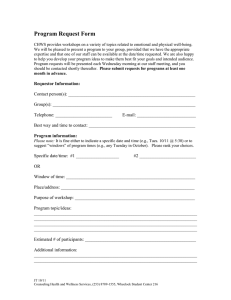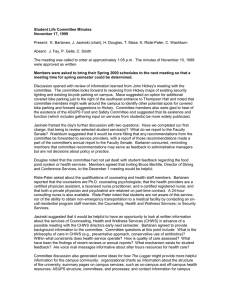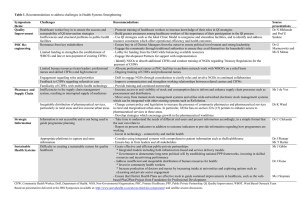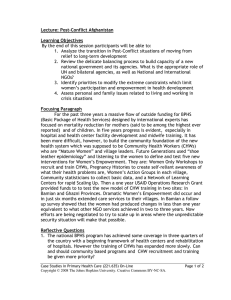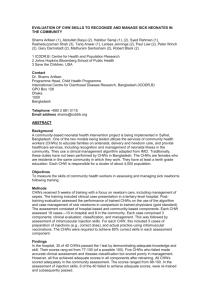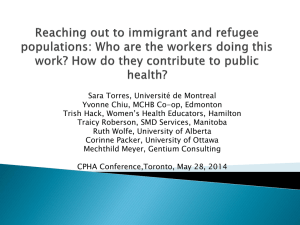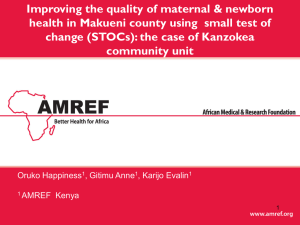Document 12289700
advertisement
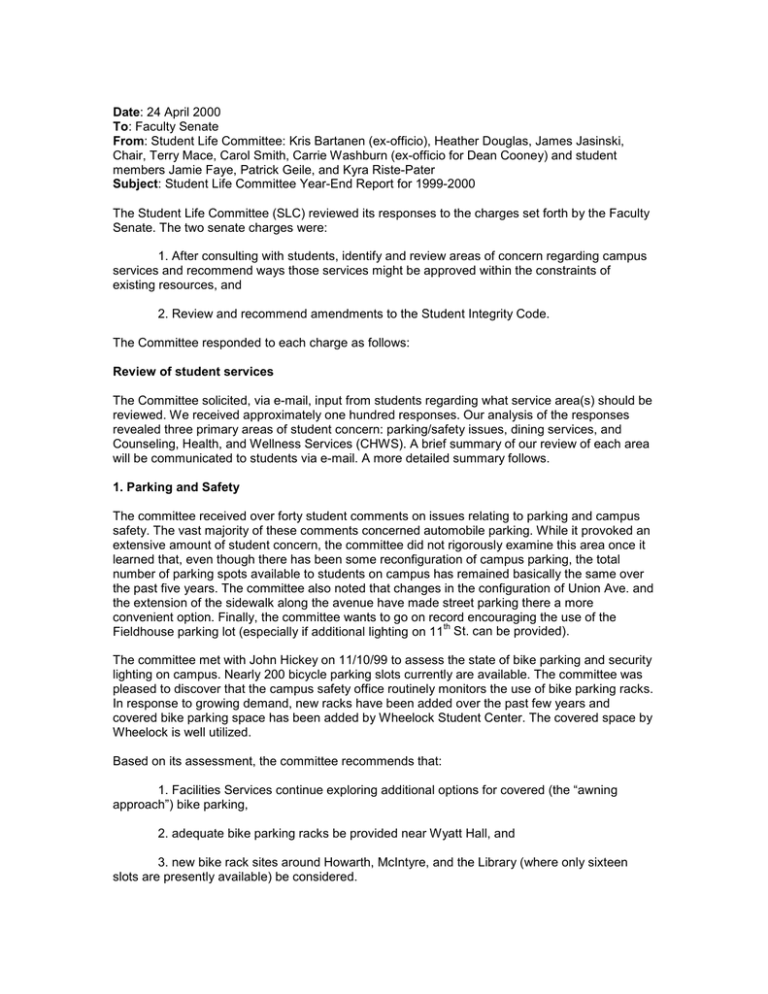
Date: 24 April 2000 To: Faculty Senate From: Student Life Committee: Kris Bartanen (ex-officio), Heather Douglas, James Jasinski, Chair, Terry Mace, Carol Smith, Carrie Washburn (ex-officio for Dean Cooney) and student members Jamie Faye, Patrick Geile, and Kyra Riste-Pater Subject: Student Life Committee Year-End Report for 1999-2000 The Student Life Committee (SLC) reviewed its responses to the charges set forth by the Faculty Senate. The two senate charges were: 1. After consulting with students, identify and review areas of concern regarding campus services and recommend ways those services might be approved within the constraints of existing resources, and 2. Review and recommend amendments to the Student Integrity Code. The Committee responded to each charge as follows: Review of student services The Committee solicited, via e-mail, input from students regarding what service area(s) should be reviewed. We received approximately one hundred responses. Our analysis of the responses revealed three primary areas of student concern: parking/safety issues, dining services, and Counseling, Health, and Wellness Services (CHWS). A brief summary of our review of each area will be communicated to students via e-mail. A more detailed summary follows. 1. Parking and Safety The committee received over forty student comments on issues relating to parking and campus safety. The vast majority of these comments concerned automobile parking. While it provoked an extensive amount of student concern, the committee did not rigorously examine this area once it learned that, even though there has been some reconfiguration of campus parking, the total number of parking spots available to students on campus has remained basically the same over the past five years. The committee also noted that changes in the configuration of Union Ave. and the extension of the sidewalk along the avenue have made street parking there a more convenient option. Finally, the committee wants to go on record encouraging the use of the th Fieldhouse parking lot (especially if additional lighting on 11 St. can be provided). The committee met with John Hickey on 11/10/99 to assess the state of bike parking and security lighting on campus. Nearly 200 bicycle parking slots currently are available. The committee was pleased to discover that the campus safety office routinely monitors the use of bike parking racks. In response to growing demand, new racks have been added over the past few years and covered bike parking space has been added by Wheelock Student Center. The covered space by Wheelock is well utilized. Based on its assessment, the committee recommends that: 1. Facilities Services continue exploring additional options for covered (the “awning approach”) bike parking, 2. adequate bike parking racks be provided near Wyatt Hall, and 3. new bike rack sites around Howarth, McIntyre, and the Library (where only sixteen slots are presently available) be considered. With respect to security lighting on campus, the committee was pleased to discover that this matter is routinely monitored (e.g. campus safety conducts campus “walk arounds” on a yearly basis as a vehicle for assessing lighting) and that the ASUPS Food and Safety committee provides students with a regular vehicle for input. In conjunction with the city, new street lighting th th is being added on Union Ave. between 9 and 18 St. (between four and five pole lights on each side of the street). The committee was also pleased to discover that the recent peer security review was very positive on the quality of outdoor lighting on campus. Based on its assessment, the committee recommends that: 1. the need for more lighting around the Thompson Hall lot be addressed, th th 2. additional lighting on 11 St. and the pathway from 11 to Todd Hall be considered in order to encourage greater use of the Fieldhouse parking lot, and 3. Facilities Services, in conjunction with Security Services, consider installing an outdoor phone security system, similar to what exists at Pacific Lutheran University, especially near major student parking areas. 2. Dining Services The committee received around 20 comments concerning dining services in the student survey. Since most of the comments referred to the equity of the point/cash allocation system, the committee chose to focus on that aspect of dining services for its review. Students raised other issues in their comments, mainly about the cash prices charged for certain items. The committee was also concerned that the pricing system might favor convenience food and generally less healthy food choices. On December 1, 1999, the committee met with the new Director of Dining and Conference Services, Bruce Bechtle. He explained the point allocation system and addressed the reason cash prices and points do not equate. The students who purchase meal plans (and therefore use the point system) are charged an overhead fee that is the same regardless of the type of plan purchased. Depending on the plan students choose, they are given a certain number of "points." Points are subtracted each time they purchase items from the cafeteria, the Café, and (in the future, the Cellar). Points are assigned to items based solely on their wholesale cost. The overhead amount is determined by dividing the number of projected meal plans that will be sold into the budgeted amount of overhead (salaries, etc) associated with the Dining Services operation. The cash prices, on the other hand, are determined by the wholesale cost of the item plus a prorated charge for any preparation needed for the item. Bechtle also pointed out that students often lose track of how many points they have left during the semester. Whenever students use their point card, they can find out what their negative point use has been. Dining Services provides cards in the cafeteria that indicate the average use of points per each type of meal plan. However, the committee feels that student confusion on this whole system is sufficient to warrant establishing better communication with students. On the basis of its assessment of the Dining Services point allocation system, the committee recommends that: 1. Dining Services work to achieve as much equity as possible between the point system and cash value, and 2. in order to complement the "where you should be with negative points" cards, Dining Services create a web application that students can access to see the actual number of points they have used and what they have left. Other information students might find useful in budgeting dining points could also be part of the Web page as well as in the Dining Services brochure. The committee encourages Dining Services to explain the pricing system to students more thoroughly. The other issue that arose in the committee's discussion with Bechtle was the availability of information about ingredients in the various dishes. While Dining Services is planning to put its recipes on the Web, the committee recommends strongly that: 3. Dining Services work towards making the list of ingredients in various dishes available in the dining facility itself, so diners can see the information when they are deciding on their order, and 4. Dining Services change the name of the "Vegan" counter to "Vegetarian" to more accurately reflect the items available. Finally, after discovering that there is an ASUPS Committee—the Food and Safety Committee— that meets each week to discuss issues related to Dining Services, the committee recommends that: 5. the ASUPS Food and Safety Committee meetings be widely publicized so that students become aware of this vehicle for providing feedback to Dining Services. 3. Counseling Health and Wellness Services (CHWS) The committee received valuable student comments regarding CHWS. The majority of these comments concerned possible misdiagnoses of student ailments, the standard protocol for working with students, and CHWS follow-up after student visits. The student comments provoked an extensive amount of concern and the committee resolved to meet with the CHWS directors to discuss the concerns and then to make recommendations based upon the comments it received and the meeting's results. On January 26, 2000, the Student Life Committee met with Houston Dougharty (director of CHWS and associate dean of student services), Donn Marshall (psychologist; associate director of CHWS and head of counseling), and David Schoen (physicians assistant; associate director of CHWS and head of health services). In that meeting, the structure of CHWS, new and current programs, and the difficulties of serving a student population were discussed. In particular, it became clear that some of the perceived problems arose from the fact that students were often for the first time in their lives responsible for making their own medical choices. Nevertheless, there were several areas where clearer communication on the services available and better feedback mechanisms would assist the CHWS. On the basis of its assessment of the Counseling Health and Wellness Services (CHWS), the committee recommends that: 1. information regarding CHWS should be made clearer and more accessible by providing detailed and clear information in the Logger regarding CHWS services and philosophy of treatment, developing a section in the Parent Resource Guide on CHWS, having wellness information clearly posted in the dorms and Greek houses, developing a more extensive relationship between the student development staff and CHWS. The committee would also like CHWS to clarify information regarding whom to contact after hours for medical attention, especially regarding how students should use the consulting nurse and the services that provide transportation to the hospital, and clarify the feedback process for CHWS, particularly regarding concerns students have with the services. CHWS should make it clear that students should bring their concerns to the attention of Houston Dougharty, Director of CHWS. 2. Where possible, the Committee encourages CHWS to expand its existing follow-up procedures, especially for patients with potentially serious illnesses. One option CHWS might consider is using a work study student to make follow-up calls, and 3. CHWS continue refining existing vehicles whereby students can provide feedback on CHWS operations. 4. Responses The committee sent a copy of its findings and recommendations to each of the service areas it reviewed. John Hickey did not offer any response to the parking and safety recommendations. Bruce Bechtle reported that work is underway on recommendations #1 and #3 (although it should be kept in mind that absolute parity between points and cash cannot be reached). He believes that recommendation #2 is virtually impossible given limitations of federal privacy laws. Students currently receive information on their current points status each time they make a purchase in the Diner. The Dining Services web page provides students with a usage chart to help them monitor their consumption. Recommendation #4 has been implemented. Dining Services publicizes the Food and Safety Committee on its web site. Houston Dougharty responded on behalf of CHWS. A new CHWS brochure has been produced this spring that addresses a number of the committee’s recommendations. He identified a number of the ways in which CHWS staff currently work with Student Development and indicated that they will continue to seek out ways to do so. He also reported that a new feedback form has been implemented and the response rate thus far is very high. He reiterated his desire to have students, faculty, and staff bring any concerns about CHWS to his attention. Finally, he indicated that CHWS will look into recommendation #2 (regarding follow-up phone calls). Review of Student Integrity Code The committee undertook its second charge during the spring semester. It quickly concluded that an exhaustive review of the integrity code could not be undertaken this year. The committee decided to focus its attention on issues raised in the January 2000 Report of the Integrity Code Task Force. Based on its review of the task force report, the committee took the following action. 1. Proposed amendments to the Student Integrity Code At its 5 April, 2000 meeting, the committee voted to forward the following proposed amendments to the ASUPS Senate for further action. Amendment #1 Replace the sentence (p. 60 of the Logger) “As such, the Standards of Integrity apply to all students and student groups, both on-campus and off-campus, who are engaged in activities sponsored by the University or by a University organization, or who represent the University in some recognized capacity” with the following language: “The Standards of Integrity as embodied in the Integrity Code apply to all students enrolled at the University of Puget Sound, both on University property and in the neighboring community, and to all student activities sponsored by the University or by any registered University organization on University property or elsewhere, or in vehicles owned or leased by the University.” Amendment #2 To change, for purposes of clarification, the sentence (p. 64): “While conduct probation allows the student to continue attending classes and living in University residences, he or she may not represent the University in any capacity co-curricular or extracurricular activities (for example, in performing musical or dramatic groups, forensics, intercollegiate sports competition) or run for or hold office in any student group or organization during the probationary period.” 2. Recommended Changes to the “Procedures for Implementation” In addition to the proposed amendments, the committee has forwarded the following proposed changes to “Procedures for Implementation of the Student Integrity Code” to the Dean of Students: 1. Pending approval of language on p. 60, as noted above, delete Section I.A on page 65. 2. Revise language on p. 66 as follows: “Major violations include any acts which pose a significant threat to personal or University-owned property or to the physical safety or psychological security of individuals and/or groups within the University and neighboring community. . . . Minor violations include those which pose no significant threat to property or individuals, but which indicate a lack of regard for the rights, property, or personal privileges of individuals or groups within the University and neighboring community. . . . 3. Revise Sections VI.E, VIII.D and IX.B.5.c as recommended by the Integrity Code Task Force Report to read: “In situations where a complaint involves request for restitution of property damage, monetary sanction will be limited to reasonable and verifiable out-of-pocket expenses for repair and/or an insurance deductible. Costs for improvement or upgrade of facilities, property, etc. will not be levied in judicial sanctions. Other financial arrangements can be made in mediated settlements provided that all parties involved are in agreement.” The SLC proposed that the following charges to the SLC be considered by the Faculty Senate next year: 1. Continued examination of the Integrity Code regarding internal inconsistencies and potential ambiguity; and, 2. Examine student access to, and organization of, information regarding campus life. Final Report adopted April 19, 2000. Respectfully submitted, James Jasinski Chair
